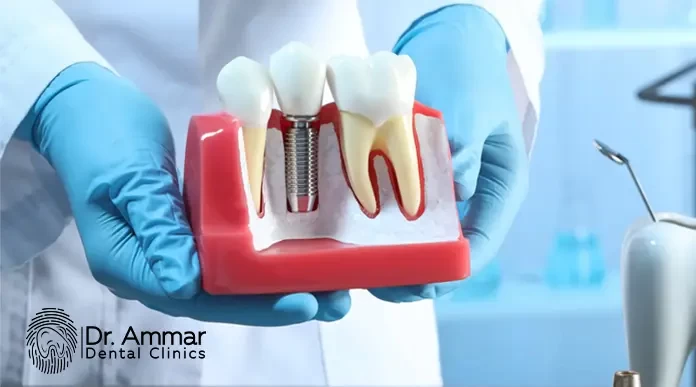Disadvantages of Dental Implants
The disadvantages of dental implants are among the things that every person should consider before deciding to undergo the procedure. Although dental implants are considered a revolutionary technique in the field of dentistry, providing a permanent and effective solution for tooth loss, there are some disadvantages and risks that patients may face.
In this article, we will comprehensively learn about the disadvantages of dental implants, in addition to answering some frequently asked questions such as: “Are dental implants painful?” We will also talk about the best dental implant center in Egypt. Keep reading to the end to get a full and comprehensive picture of this procedure.
Disadvantages of Dental Implants
Although dental implants are considered an effective and long-lasting option for replacing missing teeth, there are some disadvantages that may affect some patients’ decision. The most notable disadvantages of dental implants include:
-
High cost: Dental implants are among the most expensive dental treatment options, as the costs include the surgery itself, the implant, and the artificial crown, making them costly for many people.
-
Need for surgical procedures: Dental implants require surgical procedures that may be complex, especially in cases of bone deficiency or health problems that require special care. This may increase the level of anxiety and fear in some patients.
-
Lengthy treatment duration: The entire dental implant process can take several months to a year. This period includes surgery, healing, and osseointegration of the implant with the jaw, which may be exhausting for patients.
-
Risks and complications: Like any surgical procedure, dental implants carry risks such as infection, bleeding, and pain. Additionally, there is a risk of implant failure to integrate with the bone, and in some cases, the implant may need to be removed.
-
Need for sufficient healthy bone: Not all cases of tooth loss are suitable for implants. Patients who suffer from significant bone loss may need bone grafting procedures before implantation, which increases both complexity and cost.
-
Ongoing care and follow-up: Implants require regular care just like natural teeth, including brushing, flossing, and regular visits to the dentist for check-ups and maintenance. Neglecting this care can lead to oral health problems.
-
Biological rejection: In rare cases, the body may reject the implants as a foreign object, leading to implant failure. This rejection can occur regardless of the implant quality or the surgeon’s skill.
In conclusion, while dental implants offer excellent solutions for many patients, it is important to consider the potential disadvantages of dental implants and discuss them with your dentist to determine the best treatment option.
Are Dental Implants Painful?
After learning about the disadvantages of dental implants, we must answer one of the most frequently asked questions for those considering this procedure: “Are dental implants painful?”
In fact, although dental implants are a surgical procedure, they are usually not painful during the procedure itself because they are performed under local anesthesia. General anesthesia may also be used in certain cases, especially if complex or multiple surgical procedures are required.
After the anesthetic effects wear off, it is normal for patients to feel some pain and discomfort at the implant site, which is considered one of the most bothersome disadvantages of dental implants. This discomfort may last for several days. However, it should be noted that post-surgical pain is usually tolerable and can be managed with pain relievers prescribed by the doctor.
It is, however, important to carefully follow the doctor’s post-surgical instructions to reduce pain and accelerate healing. These instructions include maintaining oral hygiene, avoiding very hard or hot foods, and possibly avoiding smoking or drinking through a straw to prevent pressure on the surgical site.
Laser-Assisted Dental Implants in Riyadh
Laser-Assisted Dental Implants in Riyadh represent a qualitative upgrade in dentistry, providing an effective and less invasive solution to replace missing teeth. This modern technique, mastered by specialized doctors such as Dr. Ammar, uses laser beams instead of traditional surgical tools to make incisions with extreme precision. This reduces bleeding and swelling and speeds up the healing process.
Thanks to laser technology, patients in Riyadh can benefit from a more comfortable and safer dental implant experience, with excellent functional and aesthetic results that restore confidence in their smile. Choosing laser dental implants in Riyadh is a step towards better oral health and a more beautiful smile.
Best Dental Implant Center in Egypt
Choosing the best dental implant center in Egypt and the treating doctor is a crucial step in avoiding the disadvantages of dental implants. Dr. Ammar Dental Clinics are considered among the leading centers specializing in dental implants and cosmetic dentistry in Egypt and the Middle East.
The clinic is distinguished by its many years of experience, focusing on continuous development and scientific research in digital dentistry by bringing the latest global technological advancements in this field.
The clinic is managed by a group of specialists who graduated from prestigious universities in Egypt and Europe, ensuring a high level of medical services with extreme precision and professional scientific methods. Dr. Ammar, who leads this center, strives to achieve the highest possible success rates in the treatments provided, in an environment characterized by modernity and psychological comfort for patients.
The clinic works to provide a different and distinguished treatment experience for its visitors, whether from inside or outside Egypt. This has made it the best dental implant center in Egypt and the preferred destination for those seeking quality and efficiency in dental treatments. Dr. Ammar Dental Clinics are also committed to international standards in treatment and sterilization, ensuring a safe and reliable experience for all patients and applying all precautions that help avoid the disadvantages of dental implants.
Discover Before and After Cases with Dr. Ammar
In conclusion, after discussing the disadvantages of dental implants and other details about the procedure, to book an appointment at Dr. Ammar Dental Clinics, you can contact us through the text message service on our official website, and our medical team will respond to you as soon as possible.
Common Disadvantages of Dental Implants
Despite the many benefits of dental implants, there are some disadvantages that may influence many patients’ decisions.
First, time is an important factor, as dental implants require a healing period that may take several months for the bone and surrounding tissues to heal. During this period, the patient may experience discomfort or pain at the implant site.
Second, some medical complications may occur, such as gum inflammation or the body’s reaction to the implant, which may lead to procedure failure in rare cases. Additionally, the high cost may be a barrier for many people who seek more affordable alternatives.
Finally, some patients may face difficulty finding a specialized doctor or a reliable center to perform the implant procedure, which may lead to unsatisfactory results or the need for corrective procedures later.

